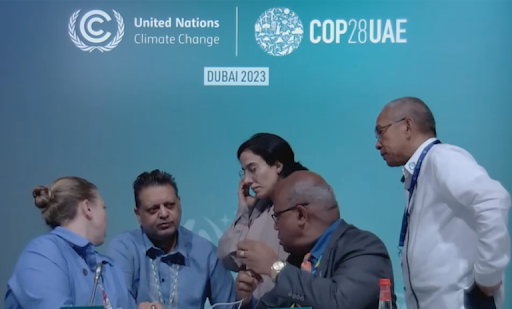LONG-TERM FINANCE: POLITICS LEADS ON TECHNICAL ASPECTS
- Divergences on negotiating methods and text, informal session suspended
- Discontent in the informal session on Long Term Finance
- Arabia and Australia highlight divergences on levels, times and methods of negotiations
It has always been known that climate finance was one of the most controversial and debated aspects of the negotiation process, especially the long-term one. This became very clear in the informal session held on Saturday morning at COP28: it was supposed to be short (45 minutes as scheduled), it became even shorter. After 15 minutes in fact, it was suspended.
A long intervention by Saudi Arabia (almost a quarter of the time available for the entire session) was based on the divergence of opinions between the levels that should conduct this negotiation. Whether the level should be political or technical and, if so, whether they necessarily need to talk to each other. “We are transferring responsibility to the ministerial level, – the Arab representative said – in a way that is completely detached from our technical discussions which could have far-reaching and widespread negative implications on lives and livelihoods around the world. This will represent a major obstacle to climate action in this decade and in decades to come, if we get it wrong”.
Before announcing a long series of his own opposition (unacceptability, literally) to the inclusion of several paragraphs in the text (in particular paragraphs 30, on the coherence between financial flows and paths with low greenhouse gas emissions; 46, on the inclusiveness of non Parties and civil society in the work program; and 48, on the co-presidency of Developed and Developing Countries), Saudi has made it clear that it wants to postpone the decision and take time: “we have one year to discuss, we don’t have to decide now. There is no metaphorical weapon aimed at our house.” Adding that on timing, the reference framework must be linked to the Global Stocktake cycle and the NDC cycle.
The word was then given to Australia on behalf of AOSIS, the Alliance of Small Island States. Who immediately underlines that there has not been “enough time to question ourselves on all these issues“. Furthermore, highlighting that there was overlap between the methods and the substance: “we would need a reference to the annex in the actual decision to be included in the last intervention, so we would like this to be the missing substantial merit“, complaining finally that they were called “very quickly to examine the procedural aspects even if you want to call it a substantial part of the decision“.
The Australian also underlined a sort of interference from the political level on the technical level (which should be of merit): “if we were to take the path of having a sort of high-level representatives, we would suggest having something more in the form of a ministerial office or a high-level office that includes representatives of all regional groups“. And, like her Arab colleague, she began to highlight parts of the text on which the group did not agree.
At that point the coordinator of the session highlighted that this was not the place to examine and discuss the substance of the text, which instead according to her should have taken place through other channels (such as e-mail) and therefore suspended the session, updating it again.
Therefore, nothing done on the topic. But what it seemed to us from the two interventions is that the presidency perhaps has the urgency, even on a delicate topic such as that of climate finance, to close a text regardless of its contents, mixing political and technical levels, procedures and merit of the issues. However, all this has led, at least for now, to an impasse.
By Paolo Della Ventura, Italian Climate Network Volunteer
Cover photo: UNFCCC Platform

